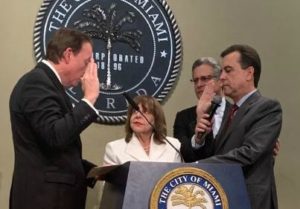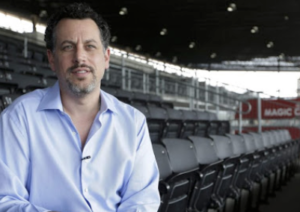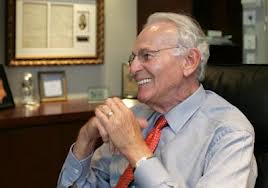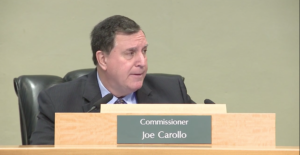As expected and predicted on this very space not long ago, Miami Commissioner Alex Diaz de la Portilla has already delivered to at least two of the investors, er, contributors who bankrolled his return to office when he helped seal a settlement deal last month for the Magic City Casino,  who had sued the city so they can build a jai-a-lai fronton and card room in Edgewater.
who had sued the city so they can build a jai-a-lai fronton and card room in Edgewater.
And bonus: He also gets to help other VIP donors like Genting as well as his Tallahassee benefactor, Senate President Bill Galvano, who is the state’s friendliest gambling legislator trying to expand gaming and got to swear DLP in after he was elected.
Everybody who thinks that Mayor Francis Suarez sold out to auto mogul Norman Braman for a measly $75,000 just because Braman’s attorney wrote the legislation and the back-up materials for it, including staff opinion, is cray cray. Baby X may have fueled those fears when he vetoed the settlement, which City Attorney Victoria Mendez said was yet another illegal veto. She has become the fourth vote on the commission by simply taking away the mayor’s veto power, which has ended up in court.
But people are wrong about this and Suarez is right. Hey, even a broken clock is right twice a day.
Read related: Miami Mayor Francis Suarez sues city over Magic City Casino settlement veto
First off, Barbara and Alexander Havenick and their family, who own Magic City Casino, are close and personal friends of the  mayor’s, who was invited to Isidore “Izzy” Havenick‘s wedding, for goodness sake. And the Havenicks have invested far more into Suarez’s many campaigns than billionaire Braman’s measly $75K. How can there be quid pro quo, as the local paper and Francis haters seems to suggest, when Suarez went with the lowest bidder?
mayor’s, who was invited to Isidore “Izzy” Havenick‘s wedding, for goodness sake. And the Havenicks have invested far more into Suarez’s many campaigns than billionaire Braman’s measly $75K. How can there be quid pro quo, as the local paper and Francis haters seems to suggest, when Suarez went with the lowest bidder?
On the other hand, the Diaz de la Portilla campaign was funded, in part, by Magic City Casino lobbyist Manny Prieguez, the former state rep who gave about $25,000 to DLP’s campaign and political action committee, that we know of, bundling gifts from his multiple family members and companies. Prieguez also raised much more money for him from others. And ADLP also got hundreds of thousands from PACs that got their money from other PACs in an endless chain to try to hide the real donors. Prieguez also acted as his consigliere, calling the media and “fixing” his problems.
And the Havenicks haven’t just contributed at least $10,000 to his campaign for city commission, they have donated tens of thousands to his multiple campaigns throughout the years and raised money for him from others.
So who is really pay-to-play?
Read related: Miami’s Alex Diaz de la Portilla got $740K between the general and the runoff
Secondly, the fact is that everyone writes legislation for everyone. Donors, activists, dentists, mothers against drunk drivers, advocates of many kinds, union leaders and, yes, lobbyists who are usually land use attorneys well versed in the gobbleygook  language used in these resolutions and ordinances and amendments and RFPs and contract extensions. Sometimes they bring the expertise or knowledge or history of or passion for the issue that the legislator doesn’t have.
language used in these resolutions and ordinances and amendments and RFPs and contract extensions. Sometimes they bring the expertise or knowledge or history of or passion for the issue that the legislator doesn’t have.
Was that a spoiler? Did anyone really think city and county and state legislators actually write that mumbo jumbo themselves?
Yes, there is staff, but they are jacks of all trades, masters of none. They definitely get a lot of the suggested content of their legislation from others, usually lobbyists, who like to specialize in something. Makes them experts at what they do. Which is getting legislation passed — or not passed.
Like former Miami City Commissioner turned lobbyist Marc Sarnoff did with the digital advertising kiosk legislation he pushed to help his client (more on that later). Sarnoff, by the way, has donated a lot of money from his political action committee to Carollo, Diaz de la Portilla and Keon Hardemon, as documented recently by Francisco Alvarado in the Florida Bulldog.
It happens at the county level, too. Ladra showed last month how a lobbyist helped write the legislation that singles out the Fisher Island Community Council so they could basically skip over the local zoning board process for a developer’s application. It happens at the state level, too. High school students and the parents of the Parkland school shooting victims helped write gun control and school safety legislation in 2018. Diaz de la Portilla, who loves to remind people that he was a senator once upon a time, has had help writing legislation. He also helped write the medical marijuana legislation after he was out of office. For him to suddenly feign surprise and indignation would be funny, if it weren’t so disingenuous.
Read related: Alex Diaz de la Portilla will tell us how to smoke pot
Nobody is saying that this is how it should be. But this is how it is, people. Does anyone think that legislators think of all the legislation they propose by themselves? Please. Of course they get suggestions, and follow up emails, and requests to add this provision and/or take out that one. That’s why there is a process that often includes committee vetting and at least two public hearings before anything is passed. This particular gambling ordinance was passed unanimously after multiple residents and business leaders spoke in favor of it at two public hearings.
What makes this newsworthy — what made it a hot, salacious tip — is that someone lazy in the mayor’s office just cut and paste  the legislation onto official letterhead, or sent Braman’s attorney the letterhead to put it on himself, and there were emails that showed the trail led back to Suarez and Braman. The staff opinion was word for word Braman’s team’s opinion. Usually, the legislation presented is not verbatim to what the lobbyists propose. Usually, it is paraphrased. Tweaked here and there.
the legislation onto official letterhead, or sent Braman’s attorney the letterhead to put it on himself, and there were emails that showed the trail led back to Suarez and Braman. The staff opinion was word for word Braman’s team’s opinion. Usually, the legislation presented is not verbatim to what the lobbyists propose. Usually, it is paraphrased. Tweaked here and there.
This was very sloppy the way it was done. But let’s look at what it was.
The ordinance would force a 4/5th vote after public hearings if any gaming entity wanted to open a new operation within the city limits. Just how is a community mitigation process for such uses a bad idea? Seems like a no brainer. Even the commission that voted unanimously on it in 2019 thought so. Because Braman and Suarez had already gotten input from developer Jorge Perez and several homeowners as well as homeowner associations along the Biscayne corridor.
One could also think it was written to protect Magic City from competition.
The lawsuit’s premise was that the ordinance targeted Magic City because the owners had already announced they would open a fronton on 30th Street in Edgewater — even before they were issued a Summer Jai Alai permit from the state in 2018. So they knew the were getting the permit. How? Who did they buy in Tallahassee? They were very confident because, by then, they had already signed an agreement with Crescent Heights development to build the fronton and card room with 24 tables at 3050 Biscayne Blvd., and had gotten a letter from the city verifying that was a permitted use on the “entertainment” zoned property.
But that debate seems disingenuous, too. Because the casino could have easily argued that the letter grandfathered them in for this location. There is legal precedent for that. It seems that they either want more than a fronton and card room or are already looking to open something else in another location.
Could they have been tipped off about Braman and the emails? Could they have felt betrayed?
Read related: Alex Diaz de la Portilla wants to silence critics and limit recalls in Miami
Braman, by the way, is a longtime opponent of gambling interests. This should not be news to anyone. He fought, and possibly killed, the Genting plan to turn the old Miami Herald site into a casino. In 2011, he fought attempts by then State Rep. Eric Fressen to expand gambling across the state. This is likely not the first time he tries to help write legislation that would block gambling or at least make the process more difficult. Why is anyone surprised he was trying to do something in his own city? Basically in his own front yard.
No, Braman is not the boogyman here. And neither is Francis Suarez.
The boogyman here is Diaz de la Portilla who just showed his donors that he delivers. Remember, this is the same gambling entity — it was Flager Dog Track back then, but still owned by the Havenicks — that bought former State Rep. David Rivera, too, by giving his 70-year-old mom (may she rest in peace) a $1 million consulting contract. How do we know there’s not someone connected to ADLP getting a contract? How do we know Renier Diaz de la Portilla isn’t working for them?
Alex also adores and kisses up to Galvano, a lawyer and former president of the National Council of Legislators from Gaming States, who has been trying to expand gambling in Florida for years. This is a nod to Tallahassee, where Diaz de la Portilla really wants to be.
After the “shade session” with the city attorney during a commission meeting last month — a closed-to-the-public session that neither Suarez nor his attorney were allowed to attend — ADLP first voted against a motion to defer the settlement for 30 days, made by Commissioner Ken Russell, who wanted to get the very community input the casino claimed the city didn’t have.
Then Diaz de la Portilla quickly made the motion to accept the settlement. Like he couldn’t wait to make the motion. He didn’t miss a beat, lest someone else make the motion before he could get to it and deliver for Prieguez, who has invested so much. Commissioner Manolo Reyes seconded and with Commissioner Keon Hardemon, Alex had the three votes he needed.
Read related: More Miami power plays prove ADLP is the new boss, runs the show
Notice two things: There was suddenly no more talk about DLP taking over Hardemon’s South East Overtown Park West  Community Redevelopment Agency. That was the deal made with Hardemon so the Three Amigos could split up and Commissioner Joe Carollo could vote no.
Community Redevelopment Agency. That was the deal made with Hardemon so the Three Amigos could split up and Commissioner Joe Carollo could vote no.
Why?
Facing a very real recall effort, Crazy Joe does not want to piss off the only person who has successfully recalled anyone (read: Carlos Alvarez) in Miami-Dade. He doesn’t want Braman reaching into his deep pockets or putting his abundant resources into the recall. He’s crazy, alright, but he’s not stupid. Notice how he didn’t even take the opportunity to blast the administration and call the mayor names — something he would not give up so easily, except he didn’t want anyone to notice his vote.
Last Thursday, Suarez filed a lawsuit to enforce his veto. He withdrew it, or it bounced back, immediately — maybe more sloppiness? — and is expected to refile it this week. But he did not veto the settlement agreement, which nobody knows what it is, because he got $75,000 from Norman Braman for the strong mayor initiative. Suarez — who is now playing with the likes of Jorge Mas — would not sell himself for a measly $75,000. The price would be higher.
Ladra may have once been a fan but those days are over. I came out strongly against the strong mayor initiative and the lease and destruction of Melreese Golf Course for a real estate deal disguised as a soccer stadium, which Baby X personally advocated far too passionately for. I have told Suarez myself that he’s got to stop being the “celebrity mayor,” which is what some people call him, roll up his very expensive sleeves and actually do something if he has a prayer of a second term, which he may not deserve. His move to hire Carlos Curbelo because he can’t be the mayor of his own city was boneheaded. Baby X is immature, arrogant and not ready for prime time.
But that doesn’t mean he can’t be right on something. And this is not about Suarez. This is about ADLP delivering to donors and the gaming industry.

